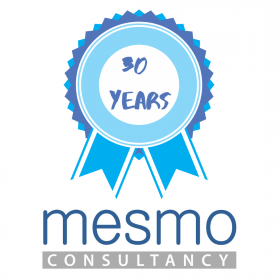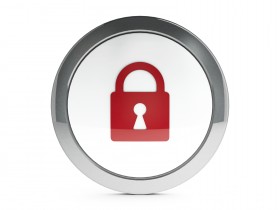Monica looks back on an impressive 30 years in business – come with us as we take a journey through our history and all we’ve achieved.
1989 what happened that year?
1989 was the year the Berlin Wall fell, the first GPS satellites were launched, Sir Tim Berners-Lee invented the world wide web, ‘The Simpsons’ debuted, Daniel Radcliffe and Taylor Swift were born, and I launched Mesmo Consultancy! Email had been invented by Ray Tomlinson (in 1971) – although like the world wide web, it was just a dot on the horizon because of the lack of user friendly hardware.
My career and work experience has always positioned me as the middle-man between the IT Department and the ‘end user’ trying to help them to learn how to use technology to improve their personal and business performance. This was pre user-friendly computers and software.
In 1993 sponsored by my client PA Consulting, I conducted an in-depth study of one hundred main board executives to establish some models and guidelines on how they could improve the bottom-line of their organisations by using personal computers. This was a time when a PC could easily take up your full airline cabin bag weight allowance. Battery life was about 30 minutes, the Blackberry had just been invented but mobile devices as we know them were still about six years away. Not everyone had access to email and even if they did, they often did not deal with it themselves. Indeed in some organisations you had to be a certain level to have your own email account. The results of the study were the basis of my PhD and my first book ‘Using the PC to Boost Executive Performance’.
In the 1990’s, executives were already complaining about how much email they received and how much time they had to spend trawling through it to find the items of importance.

Mesmo Consultancy’s first computer in 1989
However, many left their PAs to deal with email. So few executives had any idea how much time their staff were actually wasting dealing with the inbox and how it was rapidly overtaking the in-tray as their main focus. While on a contract to a major Government Department, I spent many months trying to explain this to a Permanent Secretary who said this was nonsense. He changed his mind when a train strike left him working at home and he saw the hundreds of trivial emails in his inbox. My life as an email management consultant and the ‘EmailDoctor’ began with a call from his Special Private Secretary (SPS) who said they wanted me in the office at 8.30 the next morning. I was told to ‘solve the problem of email misuse’. The rest is history, three books and hundreds of articles later.
Email Management – what has changed over 20 years?
But what has changed about how we deal with email? I trawled back through nearly twenty years worth of articles specifically on email management which included five years as The Times ‘Crème’ columnist, Director Magazine IT user columnist; Huffington Post; etc. Several key themes can be identified and in particular how to:
Perhaps the last is one of the most interesting. On the one hand you have the up and coming generation of Millenials who are so technology focused that they feel it’s ‘job done’ by hitting send, and are often the most reluctant to walk and talk. Furthermore the shorter the message the better. I agree with this, but short does not always mean unequivocal and especially to a generation of who are not digital natives of which there are still many at the top of the organisation.
Although letters are still written, for many an e-communication (email or text) is now a binding business communication and so the tone and wording is important to convey the correct image of the organisation. A constant plea from senior management is therefore to educate new joiners how to write professional emails which reflect the organisations values and culture.
What new trends have emerged over the last twenty years?
The same themes are still present even now in 2019 with some even more pronounced. For example we now receive on average 121 emails per day compared to 77 in 2003. Those who are digital natives and find technology easy to use, still do not appreciate that for many, despite the suppliers claims, it is not intuitive. This makes finding budgets for email management and email software (eg Outlook) training hard. Even today, less than 50% of Outlook’s time saving features are used by the average user (eg Rules, Quick Parts and Quick Steps).
Interestingly, we think the fax is dead but it is still used and especially in the medical profession! On top of these, six new challenges have emerged relating specifically to email management:
i. Cyber crime
ii. Data protection and GDPR
iii. Social media
iv. Collaborative tools
v. 24x7x365 work ethos
vi. Impact of digital distractions on our cognitive ability
i) Cyber crime was barely given a mention until the late 1980s and then only in passing. Now not a day passes without at least three cyber crime related stories/blog being published.
ii) Data protection was always an issue but organisations were not quite so obsessed about it. Not surprisingly, with the FOI, GDP and continued instances of hacking, most organisations now have a very heightened awareness of the need to be compliant and protect their most valuable asset – data.
iii) Social media wasn’t even born thirty years ago. If you wanted the latest news and gossip, it was garnered from a conversation around the coffee vending machine, photocopier, landline telephone chats or lunch outside the office. The loss of the art of conversation is perhaps one things which greatly saddens me . Especially when you hear of suicides caused by social media bullying.
iv) Collaborative tools are now seen as a way to reduce email overload but it still takes time to read the electronic notice board. If you elect for electronic updates then these of course often arrive by email!
v) 24x7x365 work ethos. Yes we worked just as hard thirty years ago but it was much easier to switch off and leave your work behind you when out of the office or on holiday. Constantly being in communication, is a 21st Century disease which is giving rise to concerns about our well-being and life-work balance. These are words which never existed in the board’s vocabulary until the last decade.
vi) Impact of digital distractions on our cognitive ability. Several studies have now found that constantly being distracted by email (or social media) is significantly reducing our powers of concentration and thinking to that of a three year old child.
Good, bad or indifferent
I have been very privileged to work during the ‘white hot revolution of technology’ to borrow the late Sir Harold Wilson’s words. They have been and will no doubt continue to be exciting times. I love working with young people who tell me about the latest app or hardware device. Such things still excite and amaze me. During my journey over the last thirty years I’ve met some amazing people and made many friends. However, with the exception of the impact of digital distractions on our cognitive ability, most of the problems related to email look just like new wine in old bottles but with fancy labels. For how much longer are we going to be slaves to our inboxes rather than the other way around?
Or have I been in the business so long that mine is a biased cynical view? What is your view about how technology has changed our working lives over the last thirty years (for better or worse)? Let us know on our social media channels!
Tags: 1989, cyber crime, email management, email overload, Emaildoctor, GDPR, Mesmo Consultancy, Ray Tomlinson, Social media, well being
Email security remains a top priority for most IT Departments and especially as GDPR approaches. Here are five top ways to improving email security in your organisation and make sure you are not the one to open the door to the cyber-criminal.

Concerned about any of these points? Call us now to discuss how Mesmo Consultancy’s Smart Email Management masterclasses and workshops can help improve email security.
Tags: cyber crime, email security, GDPR, password protection, Word documents and malware
The topic of well-being and email overload has featured several times over the past month. Some are arguing for old fashioned mobile phones which act solely as a phone. Whether or not this will solve the problems of email overload and digital addiction is debatable. Perhaps it is more about educating ourselves to use our smart devices smartly.
Then there is the thorny questions of whether or not it is wise to include emojis (eg smiley faces) in emails and how long before social media takes over from email. Last but by no means least 90% of us are scammed by email every month. Read on for our top five articles of note during August.
1.Taking control of your inbox in a healthy way.
Julia Schmidt PA to the Chief Executive of Basfarm a Norwegian IT service provider and undertaking a study of well-being in the workplace. As part of this she interviewed Monica. Click here for the interview and her top tips on the subject.
2. Has the smart phone destroyed a generation?
The average person checks their smart phone every six minutes according to Nancy Colier. Recent research from the USA (Professor Jean Twenge) argues that the smartphone is destroying a complete generation. They are more comfortable with technology than people than any previous generation, many are on the brink of a nervous break down.
A must read for anyone with an interest in the impact of smart phones on Millenials.
What’s your take?
3.Email still dominates work and personal communications. So you thought email might disappear soon? Think again according to the latest research from Adobe. Whilst face-to-face communications are starting to rise, emails continues to dominate with over social media. Their survey found that people are spending slightly less time checking email than a year ago. Interesting 62% prefer to check their emails on a desktop. Only half ever achieve inbox-zero and as we’ve discussed before it is questionable if this a productive exercise. Meanwhile 43% still check emails in the bathroom. And this from a company with a vested interest in social media! Makes me think we are still very much addicted to our smartphones and email and that there are few real business alternatives to email.
4.The dark side of a smiley. A new global study reveals that far from creating a warm friendly email, an emoji (emoticon) make you look less competent. We have been against their inclusion for years so this just back-up our previous opinion and findings. A thought worth keeping in mind for those who run induction courses for new graduate joiners. Keep all the emoji (smiley faces etc) for social emails only.
5.Nine in ten hit by email scams every month. Considering how much is written about reducing the risk over identity theft and cyber crime this is a very demoralising figure. Does no one read and take note? PayPal, Banks and HMRC are the top three bogus emails sent and it is often younger people who are worst hit. What does this say about their addiction to smartphone? Click here for our top tips on avoiding such scams.
Is email addiction, email overload, email etiquette effecting the performance and well-being of your workforce? Call or email us now to discuss how our email best practice workshops and consultancy service can help you.
Tags: alternatives to email, Business email management, cyber crime, Email Scams, Jean Twenge, Julia Schmidt, Milleniels, Take Control of Your Inbox
 This months business email management articles of note feature one by ourselves on how to manage the instant reply syndrome yet still make key clients feel loved. There are three on business email etiquette and the importance of communicating clearly if you want people to notice your email without being pushy. There are two on various aspects of cyber crime from house deposits going to imposter’s bank accounts and the penalty for forwarding confidential emails and then trying to delete the evidence.
This months business email management articles of note feature one by ourselves on how to manage the instant reply syndrome yet still make key clients feel loved. There are three on business email etiquette and the importance of communicating clearly if you want people to notice your email without being pushy. There are two on various aspects of cyber crime from house deposits going to imposter’s bank accounts and the penalty for forwarding confidential emails and then trying to delete the evidence.
1. Managing the Instant Reply Syndrome. You are working on an important (maybe time critical) task, yet people still expect an instant reply to their email. Based on our recent work in the independent schools sector here are some ways to manage expectations including those of your most important clients and colleagues.
2. Use stories to highlight your companies purpose. From Erica Keswin my fellow member of the Information Overload Research Group IORG this fascinating article highlights the importance on story telling to communicate your message clearly. Although emails should be short, using a client/colleague comment in the opening sentence can help your message stand out.
3. How I lost my 25 year battle against corporate claptrap. How can you commit 110%? It’s mathematical nonsense as Lucy Kellaway points out. Lucy has been the Financial Times business columnist who can be depended on to de-bunk current management guff. In her last column based on examples collected over the years she provides examples of how to write pure meaningless flannel. There are salient lessons on email etiquette to be drawn from this article. Never use long/complex words when a short one will do. Emails should be succinct and structured if you want to avoid endless rounds of email ping-pong and potential email wars. See Mesmo Consultancy’s recent video on the 5Ss of business email management etiquette.
Thank you Lucy Kellaway for writing the introduction to Brilliant Email and being subjected to a Mesmo Consultancy Email Inbox Audit from which we learnt some lessons.
4 Why those small words in an email say a lot about you. A timely reminder that how you write emails is a picture of you and your organisation. It’s your digital dress code. So why spoil a good suit by wearing war paint on your face and scruffy shoes. That is essentially what you are doing when you forget to include a greeting and use a sloppy sign-off. Check your business email etiquette. Is it up to the mark?
5. Cyber crooks loot millions set aside for house sales. It never ceases to amaze us at Mesmo Consultancy how people still fall for the simplest of cyber crime tricks. House sellers transferring deposits found that Instead of the money going to the solicitors they went to an imposter’s bank account. When undertaking such transactions always transfer a very small amount first to check they arrive in the correct account. Will we ever learn?
6. Employee sentenced to six weeks imprisonment for deleting confidential emails. So you think you can delete emails and go un-noticed? Think again. This article contains lessons for both employers and employee about sending confidential information via email.
Are these business email management issues which you or your organisation face? Call or email us now to discuss how our email best practice workshops and consultancy service can help you.
Tags: business email etiquette, cyber crime, Erica Keswin, IORG, Lucy Kellaway
 great believers in keeping your inbox as your work in hand and hence having a clean inbox. However it maybe that Inbox Zero is an out-dated and meaningless goal. Read on.
great believers in keeping your inbox as your work in hand and hence having a clean inbox. However it maybe that Inbox Zero is an out-dated and meaningless goal. Read on.Tags: business email etiquette, cyber crime, email etiquette, Mobile Email Statistics